|
This tour is made to have the mix of culture, nature
and safari adventure. This tour includes the major attractions
of the Kathmandu valley and takes you to the city of
natural beauties and centre of adventure, Pokhara and
to the Nepal's southern Terai belt for jungle safari.
Pokhara is a place of remarkable natural beauty. The
serenity of Phewa Lake and the magnificence of the fistailed
summit of Mt. Machhapuchre rising behind it create an
ambience of peace and magic. Clearly the most stunning
of Pokhara's sights is the spectacular panorama of the
Annapurna range which forms its backdrop. Royal Chitwan
National Park, the best park in Nepal for seeing animals
in wild, boasts of 450 species of birds including four
species of deer, leopard, sloth bear, wild boar and
many other wildlife. This park is well known for one
horned Rhinoceros and it is a shelter for Royal Bengal
Tigers. Besides this Chitwan also supports a great variety
of flora and fauna.
Day
01: Arrival in Kathmandu.
Upon arrival at the airport, welcome by our representative
& transfer to the Hotel. At the hotel briefing about
the program by our representative. Rest day at leisure.
Day 02: Sightseeing in Kathmandu Valley.
After breakfast, introduce with the Sightseeing Guide
& driver. We set to the first day sightseeing of
Kathmandu Valley. Today you will see the following spots;
the details are as described below:
Swoyambhunath
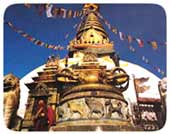 The
four seeing eyes of Swoyambhunath Stupa watch over the
valley from the top of 77-m high hillock on western
side. This most glorious Stupa in the world, is one
of the holiest Buddhist sites in Nepal and its establishment
is linked to the creation of Kathmandu valley out of
a primordial lake. The surroundings of the Swoyambhunath
are covered with small Chaityas & monasteries as
well as some Hindu temples. The National Museum and
the Museum of Natural History are situated at the foot
of the hill. The
four seeing eyes of Swoyambhunath Stupa watch over the
valley from the top of 77-m high hillock on western
side. This most glorious Stupa in the world, is one
of the holiest Buddhist sites in Nepal and its establishment
is linked to the creation of Kathmandu valley out of
a primordial lake. The surroundings of the Swoyambhunath
are covered with small Chaityas & monasteries as
well as some Hindu temples. The National Museum and
the Museum of Natural History are situated at the foot
of the hill.
Kathmandu Durbar Square
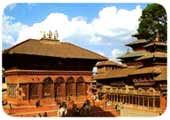 This
complex of palaces, courtyards and temples, built between
12th and 18th Centuries, used to be the seat of ancient
Malla Kings of Kathmandu. It is the place where kings
of Nepal are crowned and their coronations solemnized.
An intriguing piece here is the 17th century stone inscription
set into the wall of the palace with writings in 15
languages. Kumari Temple: Kumari temple is the residence
of the Living Goddess. Kumari, known as Virgin Goddess
has got some specialties, she must be chosen from a
typical Newari cast with no body marks & injuries
& will be replaced by another Kumari after puberty.
Kasthamandap: Kasthamandap is believed to be constructed
from the wood of a single tree in the sixteenth century.
Situated near to the Kumari Temple. The name Kathmandu
was named after this temple. This
complex of palaces, courtyards and temples, built between
12th and 18th Centuries, used to be the seat of ancient
Malla Kings of Kathmandu. It is the place where kings
of Nepal are crowned and their coronations solemnized.
An intriguing piece here is the 17th century stone inscription
set into the wall of the palace with writings in 15
languages. Kumari Temple: Kumari temple is the residence
of the Living Goddess. Kumari, known as Virgin Goddess
has got some specialties, she must be chosen from a
typical Newari cast with no body marks & injuries
& will be replaced by another Kumari after puberty.
Kasthamandap: Kasthamandap is believed to be constructed
from the wood of a single tree in the sixteenth century.
Situated near to the Kumari Temple. The name Kathmandu
was named after this temple.
Patan City:
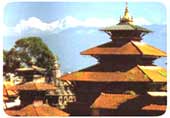 Patan
Durbar Square: Patan Durbar Square is an enchanting
melange of Palace buildings, artistic courtyards and
graceful pagoda temples. Listed as a World Heritage
Site, the former Royal Palace complex is the center
of Patan's religious and social life, and houses a museum
containing an array of bronze statues and religious
monuments. One remarkable monument here is 17th century
temple dedicated to the Hindu god Krishna, built entirely
of stone. Tibetan Refugee Camp: This camp was set up
in 1960 under the initiative of the International Red
Cross & the Swiss Development Corporation in corporation
with HMG of Nepal. Its main objective is to help the
Tibetan Refugees to do something nice & support
themselves & some carpet industries & handicrafts
have been operating. Patan
Durbar Square: Patan Durbar Square is an enchanting
melange of Palace buildings, artistic courtyards and
graceful pagoda temples. Listed as a World Heritage
Site, the former Royal Palace complex is the center
of Patan's religious and social life, and houses a museum
containing an array of bronze statues and religious
monuments. One remarkable monument here is 17th century
temple dedicated to the Hindu god Krishna, built entirely
of stone. Tibetan Refugee Camp: This camp was set up
in 1960 under the initiative of the International Red
Cross & the Swiss Development Corporation in corporation
with HMG of Nepal. Its main objective is to help the
Tibetan Refugees to do something nice & support
themselves & some carpet industries & handicrafts
have been operating.
Day 03: Drive to Pokhara.
After breakfast drive to Pokhara. A very scenic drive
lasts for about 6 hrs through the beautiful riverbanks
& gorges.
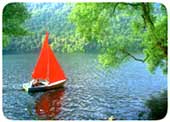 Pokhara
is the city of adventure. An enchanting city nestled
in a tranquil valley (827 m); it is the starting point
for many of Nepal's most popular trekking & rafting
destination. Pokhara is the second largest city of Nepal.
There serenity of Phewa Lake and the magnificent Mt.
Fishtail rising behind it create an ambience of peace
& magic. At an elevation lower than Kathmandu, it
has much more typical feel to it, a fact well appreciated
by the diversity of flowers, which prosper in its environs.
Indeed, the valley surrounding Pokhara is home to thick
forests, gushing rivers, and emerald lakes and of course,
the world famous views of the Himalaya. The best &
closer views of Annapurna Ranges & Mt. Fishtail
can be seen from here. Pokhara is well connected by
air & land with Kathmandu (200 km far & 30 minutes
flight) as well as by land with other major destinations
of Nepal. The major attractions of Pokhara city are:
Phewa Lake, Barahi Temple, Devin's fall, Bindabasini
Temple, Seti George etc. Pokhara
is the city of adventure. An enchanting city nestled
in a tranquil valley (827 m); it is the starting point
for many of Nepal's most popular trekking & rafting
destination. Pokhara is the second largest city of Nepal.
There serenity of Phewa Lake and the magnificent Mt.
Fishtail rising behind it create an ambience of peace
& magic. At an elevation lower than Kathmandu, it
has much more typical feel to it, a fact well appreciated
by the diversity of flowers, which prosper in its environs.
Indeed, the valley surrounding Pokhara is home to thick
forests, gushing rivers, and emerald lakes and of course,
the world famous views of the Himalaya. The best &
closer views of Annapurna Ranges & Mt. Fishtail
can be seen from here. Pokhara is well connected by
air & land with Kathmandu (200 km far & 30 minutes
flight) as well as by land with other major destinations
of Nepal. The major attractions of Pokhara city are:
Phewa Lake, Barahi Temple, Devin's fall, Bindabasini
Temple, Seti George etc.
Day 04: Drive Pokhara-Chitwan National
Park.
After breakfast, enjoy a pleasant boat ride in Phewa
Lake reflecting the panoramic views of Mt. Fishtail
on its backdrop. Then drive to Chitwan, about 5-hrs
drive. Upon arrival at the Lodge welcome & briefing
by the naturalist.. After Lunch, either canoe or elephant
ride.
Day 05: Chitwan National Park:
Whole day Jungle activities including Jungle walk, elephant
ride, canoe ride, village visit etc. Chitwan National
Park is the most famous national park in Nepal. Which
offers 450 species of birds including four species of
deer, leopard, sloth bear, wild boar & many other
wildlife. This park is well known for one horned Rhinoceros
& it is a shelter for few Royal Bengal Tigers. Besides
this Chitwan also supports a great variety of flora
& fauna.
Day 06: Chitwan - Kathmandu:
Early in the morning, after/tea coffee; set for the
Jungle walk & bird watching. After breakfast, drive
to Kathmandu. The drive from Chitwan to Kathmandu takes
about 6 hours and the drive passes through the beautiful
valleys, bank of the river and arrives in Kathmandu
via Nag Dhunga pass(1800m).
Day 07: Sightseeing in Kathmandu Valley.
After breakfast set for the another day's sightseeing:
Boudhanath
This Stupa lies 6-km downtown Kathmandu.
This colossal and ancient Stupa, one of the biggest
in the world, has the all-seeing eyes of Lord Buddha.
It was built in the fifth century AD. It is built on
an octagonal base inset with prayer wheels. One can
observe devotees chanting religious hymns & playing
with prayer wheels.
Pashupatinath Temple
 Situated
5 km east on the bank of sacred Bagmati River, the temple
of Lord Shiva with two-tiered golden roof and silver
doors is famous for its superb architecture. Chronicles
indicate the temple's existence prior 400 AD. Devotees
can be seen taking ritual dips in the holy Bagmati River Situated
5 km east on the bank of sacred Bagmati River, the temple
of Lord Shiva with two-tiered golden roof and silver
doors is famous for its superb architecture. Chronicles
indicate the temple's existence prior 400 AD. Devotees
can be seen taking ritual dips in the holy Bagmati River
Bhaktapur City:
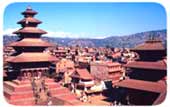 Durbar
Square: As you walk in, you can not but be overcome
by a feeling of inner harmony. Such is the art and architecture
and the special layout here. The 15th century Palace
of 55 windows, situated to the left as you enter through
the city gate, inspires admiration. The National Art
Gallery is also situated inside. The Palace Entrance,
Golden Gate that is the entrance to the main courtyard
of the Palace of 55 windows, is masterpiece in repousse
art. In front of the palace building is a medley of
temples of various designs. There are temples like Batsala
Temple and the Shiva temple, the replica of Pashupatinath
Temple etc. Nyatapola Temple: This five story pagoda
was built in 1702 AD. Each story has pair of figures
(two wrestlers, two elephants, two lions, two griffins
and goddess's tigress & lioness). This temple is
one of the tallest pagodas & famous for its massive
structure and subtle workmanship. Durbar
Square: As you walk in, you can not but be overcome
by a feeling of inner harmony. Such is the art and architecture
and the special layout here. The 15th century Palace
of 55 windows, situated to the left as you enter through
the city gate, inspires admiration. The National Art
Gallery is also situated inside. The Palace Entrance,
Golden Gate that is the entrance to the main courtyard
of the Palace of 55 windows, is masterpiece in repousse
art. In front of the palace building is a medley of
temples of various designs. There are temples like Batsala
Temple and the Shiva temple, the replica of Pashupatinath
Temple etc. Nyatapola Temple: This five story pagoda
was built in 1702 AD. Each story has pair of figures
(two wrestlers, two elephants, two lions, two griffins
and goddess's tigress & lioness). This temple is
one of the tallest pagodas & famous for its massive
structure and subtle workmanship.
Day 08: After breakfast transfer
to the airport to fly to onward destination.
|


